When Keto Can Be Dangerous
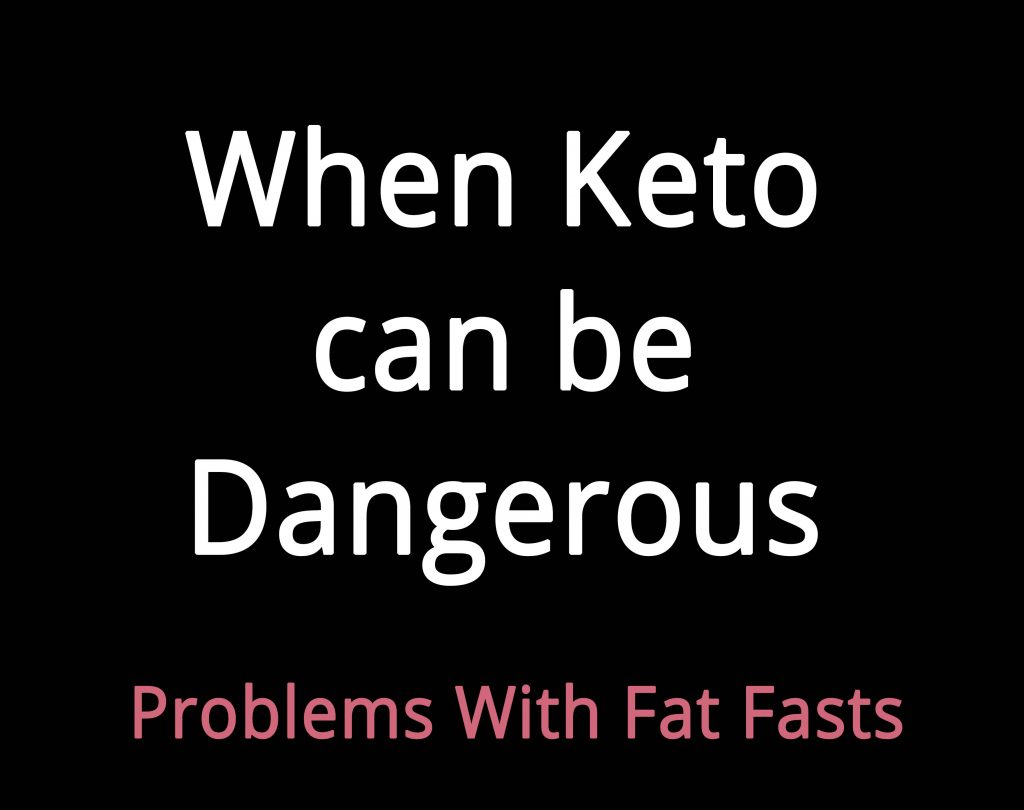
Keto has become really popular. Unfortunately, there is also some really bad keto advice out there. How many of you have seen somebody who isn’t losing weight and is told to “up the fat and lower the protein” or “make sure to get your fat in” or “try a fat fast”. In this article we will discuss the science and biology that makes these statements not only bad advice but potentially dangerous for your health long term.
Manipulation of Blood Markers
Our bodies are amazing at adapting and reacting to the inputs (food) we give it. Our friend Dave Feldman is doing an amazing job of showing this. He has been doing some amazing things with manipulating his diet to create drastic changes in his blood levels of cholesterol, triglycerides and even thickness of his arterial walls!
How quickly you can change your bod’s blood markers like cholesterol or triglycerides shows how the body is changing based on the inputs it is given. Let’s take a look at blood triglycerides and the health effects of high triglycerides.
Triglycerides
There are a lot of different opinions on markers like blood cholesterol and LDL levels. But what is universally accepted is that high blood fat (triglycerides) is very dangerous long term. The body likes to tightly control the amount of fuel in your blood at any given time. Too much fuel is damaging just like too much fuel in an engine. Some have more short-term risks (like chronically high blood glucose levels that could actually kill you) and some have long term health effects like high triglycerides.
You do not want high fasting triglyceride levels. It is associated with increased risk for many diseases. Elevated levels of triglycerides in your blood can increase your risk of developing diabetes, cardiovascular illnesses, and other life-threatening diseases(source). You do not want elevated blood triglycerides. That is pretty much universally understood and similar to detrimental effects of elevated blood glucose.
The 90% Fat Experiment
So many people are taking this bad advice to eat lots of fat, reach a fat goal, do a fat fast, eat fat bombs or bullet proof coffee. All of these have one thing in common, very high fat levels at the expense of lower protein levels.
As an experiment another friend of ours, Mike Berta, recently participated in a N=1 where he ate 90% fat for one week to see the effects on his body. Mike has a great keto success story where he has lost over 70 pounds in 3 years following a well formulated ketogenic diet with enough protein and moderating fat levels as needed to lose weight. He used the guidance of Dr Ted Naiman to achieve his amazing results.
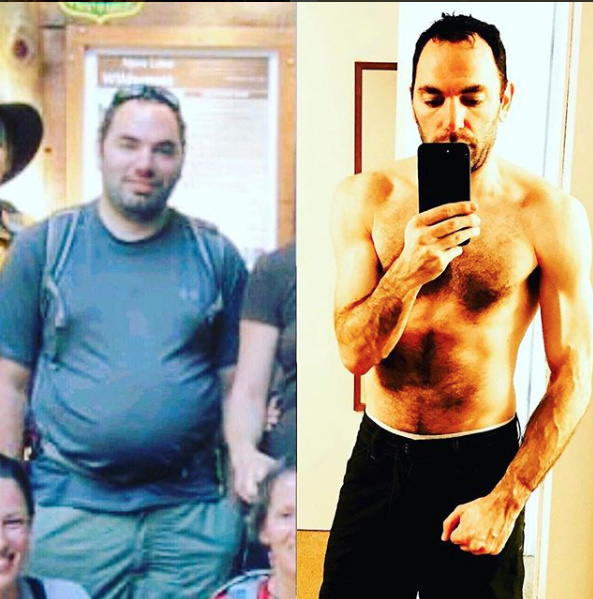
Mike is now pretty lean and as is shown from these photos and his fasting insulin levels, he is well below his personal fat threshold. This is an important note in the analysis of what happened in his experiment.
What is a personal fat threshold? As we describe in our book Keto, insulin rises the closer you get to your personal fat threshold or the point where the adipocytes (fat cells) you have get over stuffed and inflamed. This could be a small amount of fat or a large amount of body fat depending on the person’s number of adipocytes. Some people don’t have many adipocytes but the ones they have are over stuffed and inflamed. They can be 130 pounds but have insulin resistance because their fat cells are filled. Another person can be very insulin sensitive with 75 or 100 pounds of body fat because they have a lot of adipocytes tissues and they aren’t all over stuffed and inflamed yet.
This is why someone who is overweight can be insulin sensitive, but they will have higher basal insulin levels because the body has to produce more insulin to hold back the extra body fat from entering the blood and over supplying the blood with fuel. Someone in this state could have fasting insulin levels of 10-15 compared to Mike’s 2.5.
Let’s take a look at Mike’s labs before his experiment. Here are his fasted lab levels before the experiment, specifically his triglyceride levels.

His triglycerides are good at 118 mg/dL. Around 100 is great, under 100 is ideal. But Mike has great markers in his before labs including low A1c (4.8%), low insulin (2.5), low inflammation (hsCRP of 0.2) and other markers in the healthy range. These are all benefits many of our clients see with a well formulated ketogenic diet. We see many clients who have triglycerides that drop from 400 or more down to 100s pretty quickly eating a well formulated keto diet. But you can do keto the wrong way, and this is an example of that.
So what happened after one week of eating 90% fat? Surely 90% fat is still highly ketogenic. Here are his triglycerides AFTER one week of 90% fat.

That is not a typo or a lab error. His triglycerides went from 118 to 1,201 in just 1 week of eating 90% fat! His other markers of inflammation, A1c, CRP were all relatively unchanged. He went back to his normal well formulated ketogenic diet the next week and his triglycerides returned to 85.
So what on earth happened to his triglycerides? I had some ideas so to test them out I reached out to the person who has one of the best understanding of fatty acid metabolism.
My friend Mike Julian was gracious enough to give me this description of what he thinks happened.
“I can’t say this is the gospel, but my hunch is that I think it happens precisely because of the stable/low insulin. What impetus is in place to rapidly clear the triglycerides? The low protein or worse yet something like a fat fast would predictably yield similar results I believe.
Lipolysis has no acute signal to stop so you effectively have adipose in a wide open state and then you throw heaps of dietary fat into circulation.
Acylation-stimulating protein (ASP) will place dietary lipids in storage without an acute rise in insulin levels. But a key point about ASP is that its actions are permitted by a requisite level of insulin. This is why a t1d not taking insulin can’t store lipid (fat) even if ASP is alive and well. There needs to be an appropriate basal (of baseline) level of insulin present and then ASP functions properly. Mike Berta is very lean and has a very low basal/fasting insulin. It’s possible that what he experienced was what would ultimately be a short term side effect of having low insulin and being relatively insulin sensitive going into it and that the acute insulin resistance brought about by the sudden increase in fat is what created this rise in fasting Triglycerides. Perhaps if he persisted his basal insulin levels would’ve risen and he would’ve begun to properly clear the lipid from circulation and into storage properly, the side effect being fat gain.
This phenomenon might actually explain why some lean individuals who follow bad keto advice literally believe that they can’t get fat when they raise their dietary fat. Perhaps the peripheral insulin resistance they might be creating is making it difficult for their adipose to store it so it instead lingers in circulation for much longer, which is probably not great in the long run.
Where I’m going with that is this fat is stored in lean tissues via gradient. If the circulation is flooded then ALL tissues accumulate lipid.
If that is happening and you toss a consistent dietary surplus in on top of it, you MIGHT be setting yourself up for a poor long term outcome.” – Mike Julian
Because Mike Berta is well below his personal fat threshold and has low basal or fasting insulin levels, the high fat diet combined with low carbs and low protein doesn’t produce enough insulin to store the fat into fat cells so it lingers in the blood creating very high fasting triglyceride levels. In the next section I try to explain further what Mike is describing.
Fatty Acid Metabolism
There is a lot of talk about protein in the ketogenic community. Worries about “too much protein turning into glucose” are really a myth that we have discussed in detail in our book Keto as well as HERE and HERE. Getting enough protein is very important for long term health. Maintaining lean mass as we age is very important. You don’t want to be wheelchair bound and frail when you are older. So hitting your protein goal or going over it are very important for quality of life as we age. Oh, and when we age, we need more protein. The adult recommendation of 0.8 times your lean body mass for grams of protein a day goes up to 1.0 or more just to maintain lean mass when you are in your 60-70s.
But there is another very dangerous effect of too little protein when it is combined with too much fat in the diet.
Almost all fat that comes in through the diet end up in the bloodstream as chylomicrons. At this stage they have two fates, either be used as fuel in the muscle and other tissues or be stored in our adipocytes (fat cells). Studies have shown that most of the fat first goes to our fat storage before later coming out of fat storage and used as fuel. The mobilization of fat from your fat stores to be used as fuel is called lipolysis.
So what puts fat into storage? There are a couple mechanisms. The main and primary controller is insulin. Yes, fat does raise insulin levels, not as much as protein or carbs, but it does raise insulin a bit.
Insulin does two things. It helps store fuels (fat and glucose) into the tissues. Either muscle (glycogen) or adipocytes (fat). It also acts as a net to hold back fat or glucose from being released from the fat cells or muscle. This makes sense because if you have a large amount of glucose or fat coming in through the meal, the body doesn’t want an oversupply of fuel in the blood so it stops adding fuel (stops lipolysis) and starts storing it to lower the blood fuel levels.
But there is also a lesser known process for storing fat and that is Acylation-stimulating protein (ASP). This is a process that helps put fat into storage when insulin levels aren’t very high. But there is a threshold level of basal or fasting insulin to enable ASP to function properly. And in Mike’s case, his low fasting insulin of 2.5 meant that he didn’t have enough insulin to store the fat coming in from the diet (and hold back more from coming out of fat cells or lipolysis). So the fat accumulated in his blood and resulted in very high triglycerides. Over time, if he continued doing this (or a fat fast, etc) he will have fat getting stored everywhere in the liver, pancreas and other tissues, that subcutaneous fat that is so detrimental for health. Not a good idea.
Harmful Effects of Bulletproof Coffee and Fat Bombs
Also important to note is the rate of uptake of these process oils. MCT oils and drinking calories enables you to drink a large amount of fat very quickly. This floods the system with energy that it struggles to deal with. In nature we don’t have this scenario. You don’t eat pure, refined liquid fats. You eat foods like protein that contain fats. In that way these refined oils can be looked at as very much like processed foods. Highly refined, loaded with empty calories and devoid of micronutrients.
So you are probably saying “but I am above my fat threshold, I still have 40 pounds to lose”. Yes, in that case there would likely be enough basal insulin to store the fat eaten. If weight loss is your goal, storing a bunch of fat into your fat cells is not what you want to do. You want a negative fat flux (more fat coming out of adipocytes than going back in). In addition to these issues, you are not getting enough protein so you are losing that precious lean mass over time. Not what we want as we age.
Just Eat Whole Foods
You might be saying, you have some fat bomb or similar recipes. We have always told clients, only use those during the first couple weeks of going keto if needed to fight cravings or hunger. But once keto adapted, remove them. Your body can now use body fat for fuel just as well as dietary so you want it using more body fat instead of dietary (which is fat loss).
Drinking a fatty coffee (or bullet proof coffee) for your first meal has many negatives. For weight loss, you are tipping your fat balance to the diet meaning you will burn less body fat for fuel.
Also, you don’t get any of the valuable protein! Now if you are thinking “I will just add some protein powder to my fatty coffee”, that isn’t the way to go either. Just look at how many nutrients you get from whole foods compared to a fatty coffee for the same 400 calories.
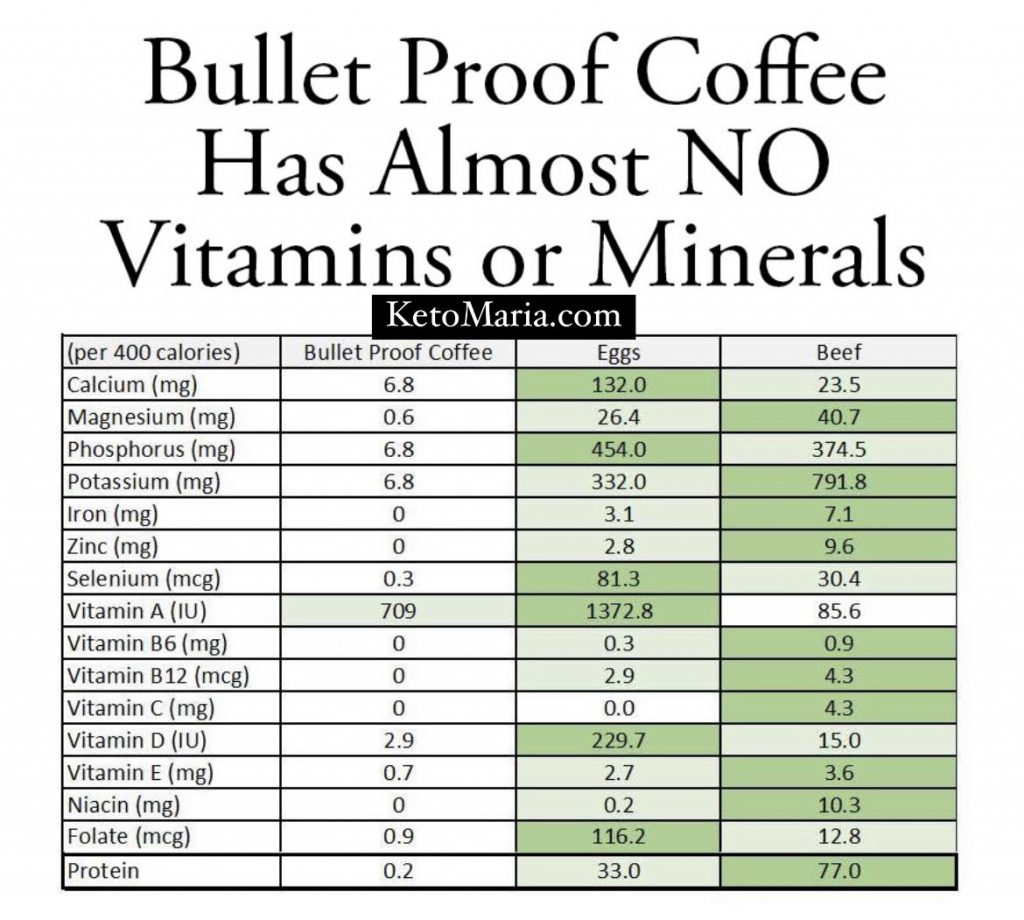
Eggs, and even better beef, provide much more vitamins, minerals and complete proteins. It is time to ditch all the products like MCT powder, fat shots, fatty coffee, fatty lattes and fatty drinks in general. And fat bombs are a transition tool, not a long-term staple. Don’t do fat fasts.
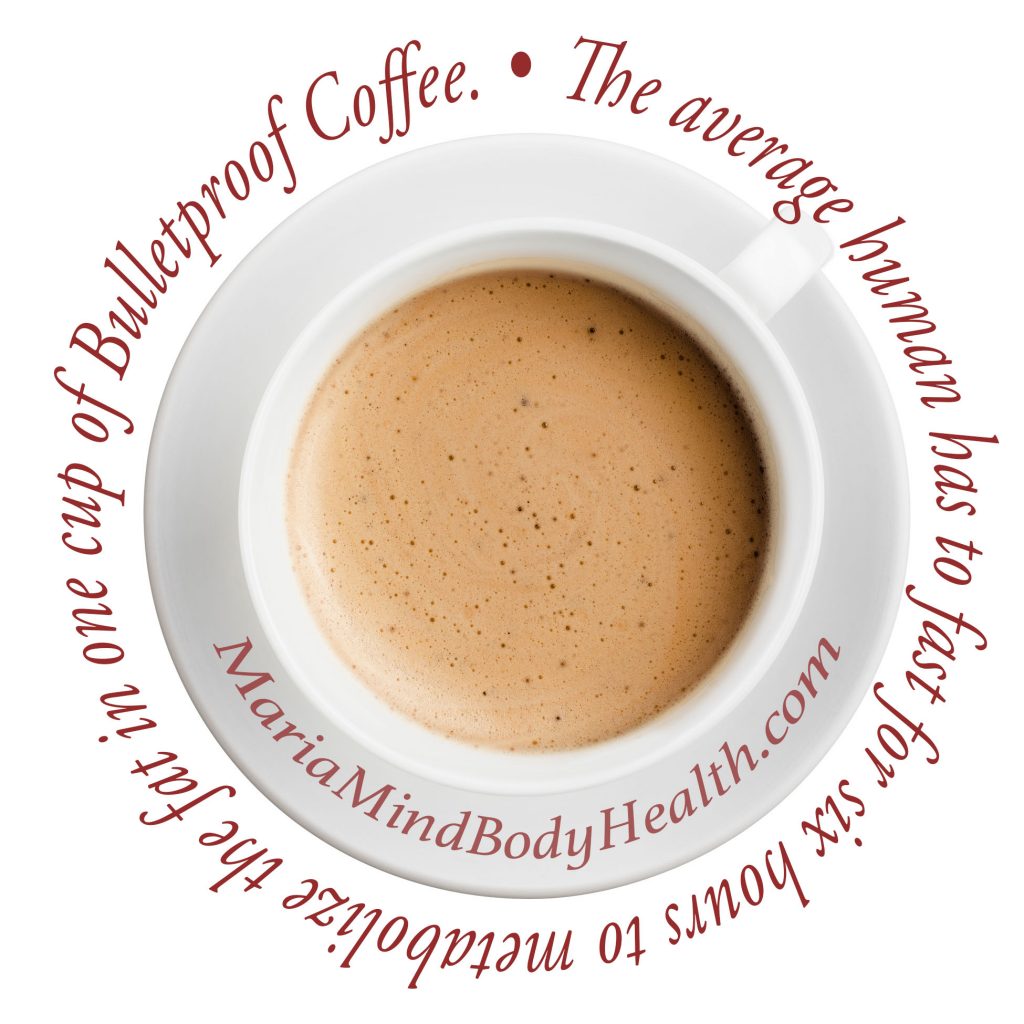
Just stick with whole foods and in general don’t drink your calories. Chewing slows down ingestion of calories and registers leptin better. Let your body use its own body fat for fuel instead to help you lose weight. Your body with thank you and your cells will get all the vitamins and minerals they need to stay happy and healthy.
Click HERE to read how to cut the coffee!

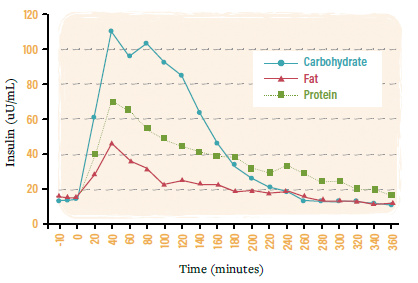
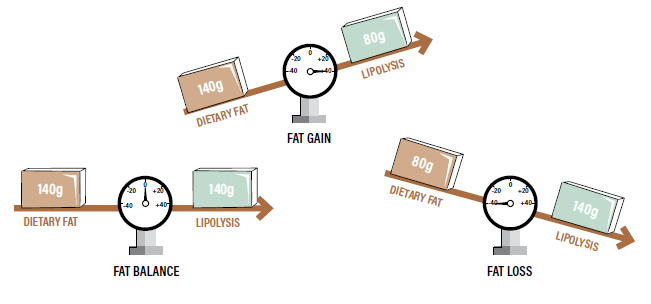
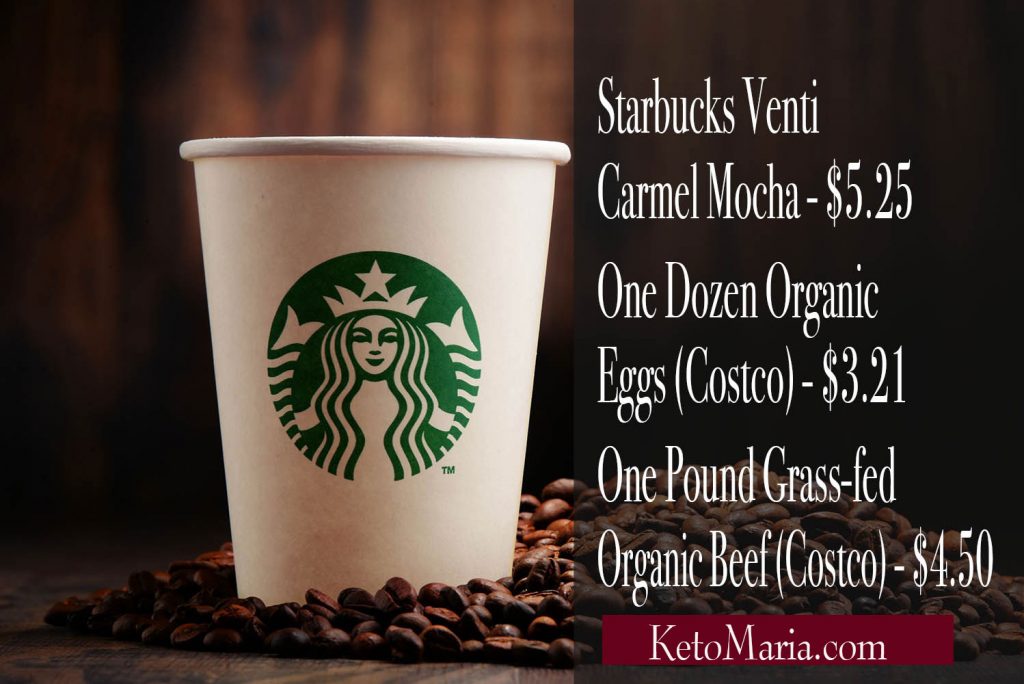
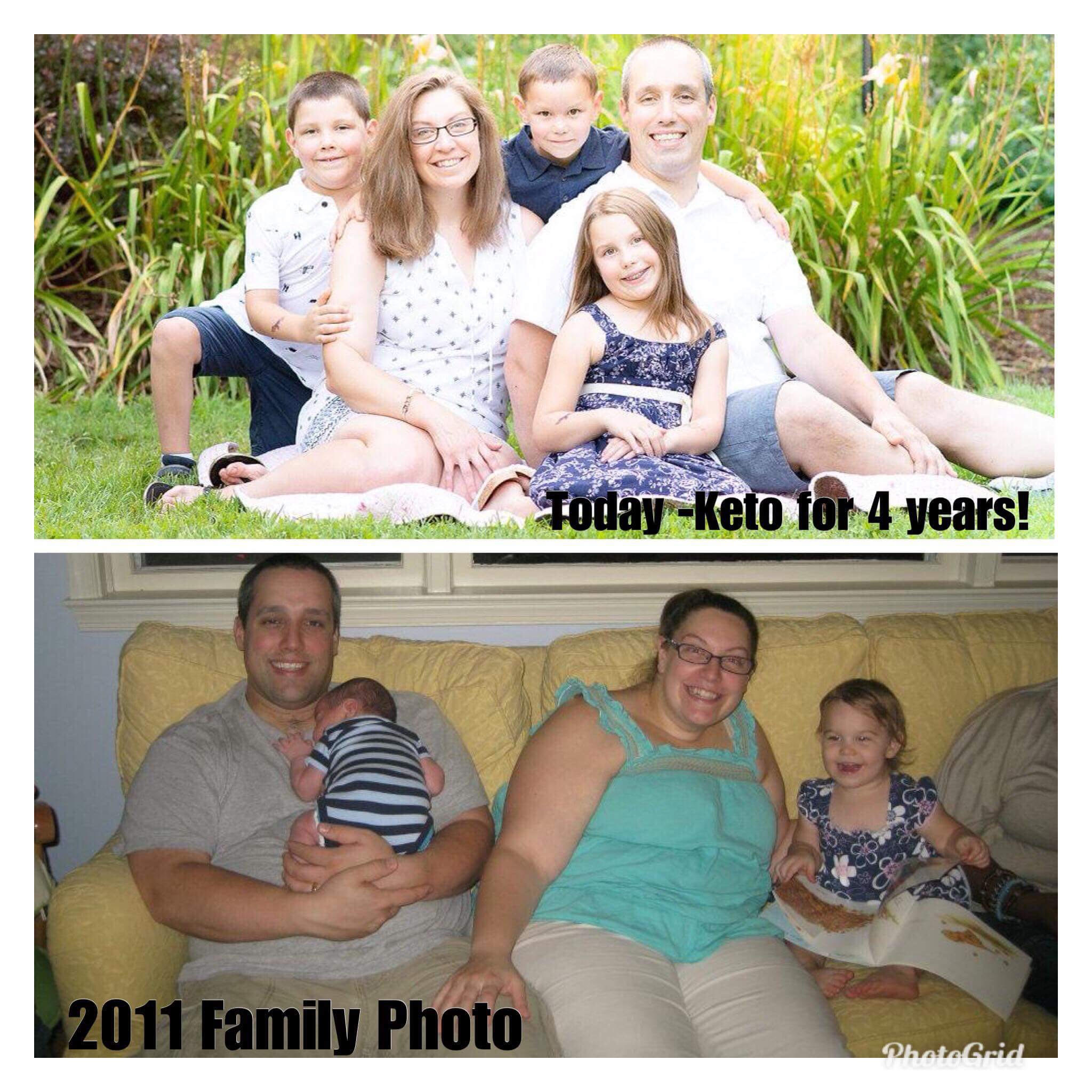

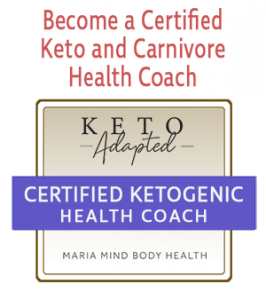

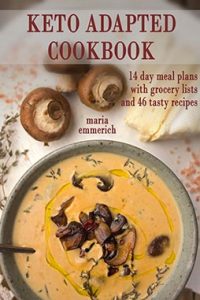
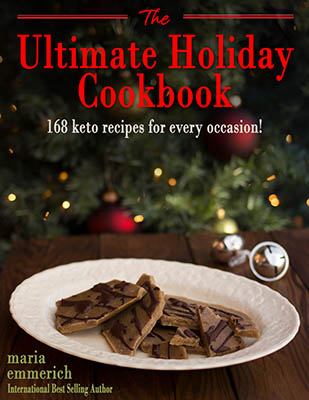
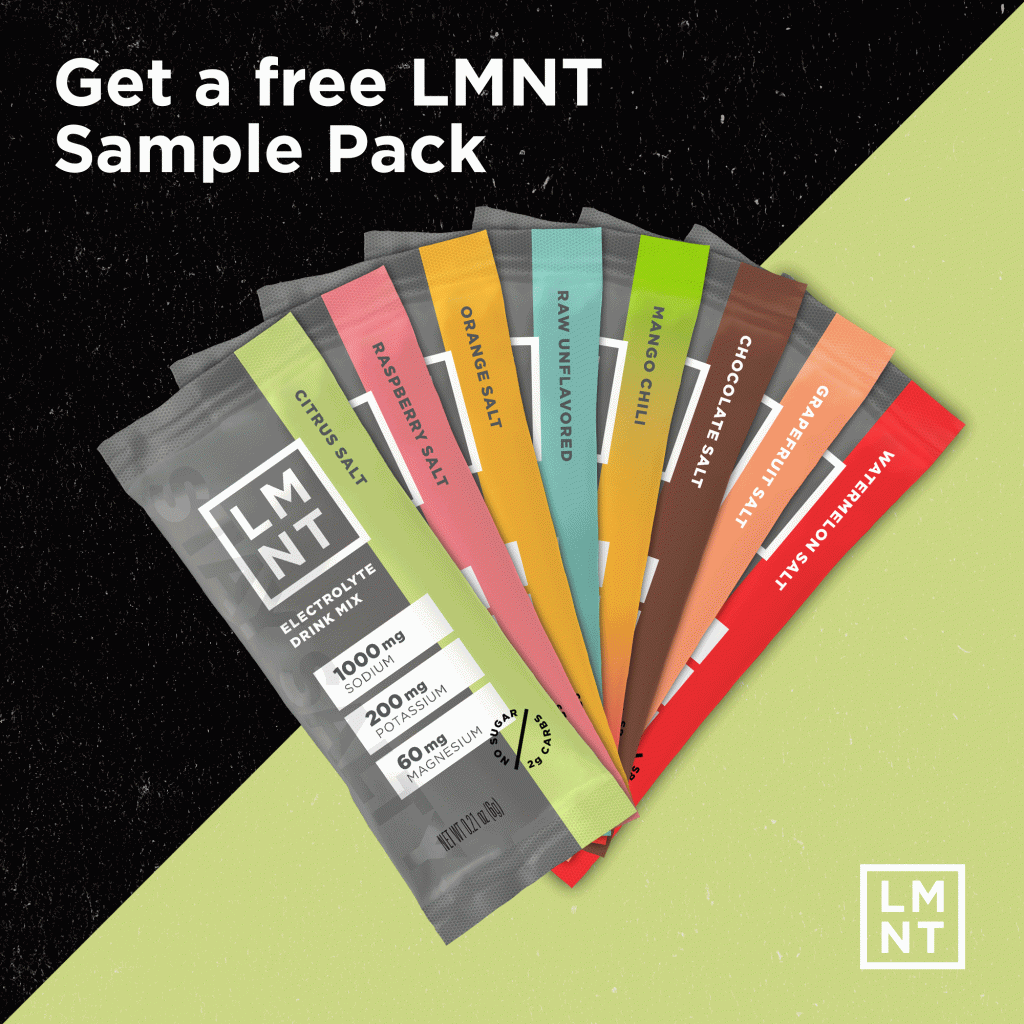
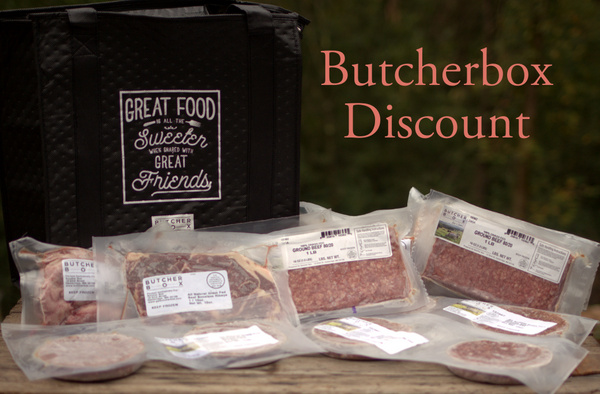


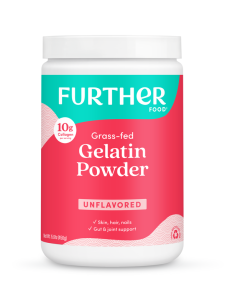

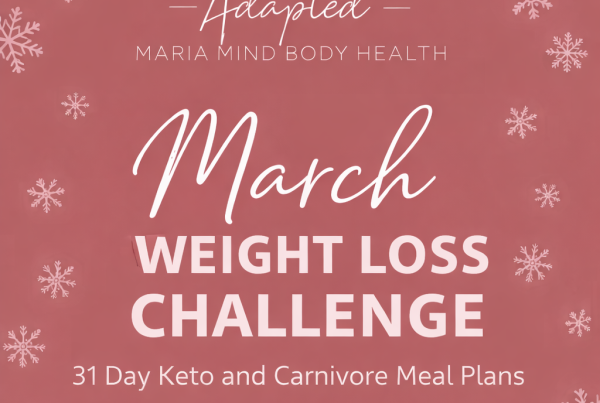


Very interesting about cutting back all those fat bomb, butter in coffee, and your own body burning the fat that has been stored in my body. Month 5 keto lost several inches 25 lbs. I have not had any bloodwork at this point. I had a stomache stapling back in the 80s so i can only eat so much at a time, getting all my potassium amounts in a day is difficult. A week ago every morning around 9 i have had a drink i c kale 1/2 c berries tsp coconut oil and cinnamon water also i had problems with the fat as well i have no gall bladder
I started taking bile salts big differance
Thanks for all your info
Stick to primarily animal proteins. As you can see in the chart above, they have as much potassium as just about anything. And you get the protein your body needs.
Trying to comprehend all the science in the article. But since
I’ve started keto I haven’t had the weight loss others have had. Thought about just going back to Atkins bc the mixed messages about fat vs protein in Macros is just too confusing. I spent three mos trying to adjust my numbers as per advice from many but no good. Not sure this is for me. All the macro calculators have basically the same numbers. Very frustrating
Have you tried ours at the bottom of this page? Also try adding PSMF to improve results.
https://keto-adapted.com/product/protein-sparing-modified-fast-cookbook/
What is PSMF?
Oops scratch that comment 😬😉
Are you going to make this available on Kindle by any chance?
Our book Keto? It already is. 🙂
Thank you! This is all new information to me, so I was unaware. My triglycerides went up to 280! I will cut back on the fat. Thank you – you may have saved my life!!
Thanks!
Love the information, however, I’m sooo confused. I thought KETO is a high fat diet. If I eat moderate protein and low carbs, how do I know how much fat to eat? I’ve used various macro models and the scale doesn’t move. So, the question is, if I’m supplying my body with fat (by eating) how/when will my body release the stored fat? I’ve read your book/articles wherein you say to use fat as a lever, but I don’t know how to put that in practical terms. Can you please help and further explain. Thank you would much appreciate a response!!
Being keto only has one requirement, carbs low enough. Are you keto when you fast? Of course and there is zero fat in the diet then.
Fat is a limit, not a goal. Protein is the only goal. Our calculator here can help:
http://mariamindbodyhealth.com/keto-calculator/
Is the right to enter, your goal weight or your current weight?
Current weight if you have an accurate bodyfat percentage. But many people underestimate bodyfat. So a good way to think of it is, what is my goal weight and goal bodyfat? If it is 150 and 30% then lean mass is 100. 0.8 times lean mass is protein goal so that would be 80g. So make sure the calculator gives you 80g protein a bit more.
Also, for best weight loss results, enter sedentary into the calculator.
I am so glad to read this as I have been struggling and questioning this type of Keto. I have some Keto dieters at my gym who make loads of fat bombs and will go high high fat and neglect the protein. Some are only eating 1/2 their protein which I find a little disturbing. Correct me if I am wrong Maria, but can’t you lose muscle mass if you follow this type of Keto that I mentioned to you? Not your method, which I find very educational and more believable. If it’s too good to be true, then perhaps it is just that, a fantasy or wishful thinking :). Some of them are having results but I am not so much with the BPC and MCT’s that you say we shouldn’t have. Thank you!!
Thanks!
Yes you will lose lean mass over time with low protein.
I inputted the info and then what do you do, there is no way to enter info to get results that I can see?
You let the fat take of itself. Put some butter on your veggies. Use cream, not milk in your coffee. Add a bit of cream sauce on your chicken or sauteed mushrooms for your steak once in a while. Eat a couple of slices of bacon or sausage links or patties with your (whole) eggs. Eat full fat cheese. Eat chicken thighs if you prefer them. Eat the chicken skin, if you want to. Eat ribeye instead of sirloin, if you prefer it. Use full fat salad dressing. Put a couple of slices of avocado on your salad. Use full fat mayo in your chicken or tuna salad. Use enough fat to make the food taste good, but don’t add extra just for the sake of adding extra. Stuff like that. Just don’t go out of your way to eat fat and drop your protein..like bulletproof coffee, fat bombs, etc.
I would add that there is nothing wrong with eating leaner proteins too if weight loss is the goal. Chicken breast, Steak, etc.
So if weight (fat) loss is the goal AND insulin resistance is present, is limiting fat PSMF-style still appropraite?
Yes definitely. PSMF is great.
So for those with insulin resistance who have failed to lose body fat on low carb, should go leaner to burn body fat? There are so many people screaming that it is gluconeogenesis from the protein that is causing the lack of fat loss, and to really cut protein and eat every bite filled with fat.
Correct, reduce fat intake and make sure you are getting enough protein. The fears of gluconeogenesis are a myth we debunk in our book Keto.
I am really confused. I have been drinking bullet proof coffee with heavy cream and Mct oil and butter like Harlan has said. Now I understand it’s not good for you ? Please help me understand.
Like we said in the article, there is a lot of bad keto advise out there form people jumping in now that keto is popular. We have been helping clients with Keto for almost 20 years. Just stick to whole foods. It is much healthier for you and you will likely lose weight faster. 🙂
Hi Maria, I am new to Keto and enjoying your book 30 day Keto cleanse. In that book I thought you promote MCT oil. Could you clarify when to use and not to use? I have gotten to enjoy my BPC in the morning. Thank you
I use MCT oil in some recipes (mainly dressings or sauces). But that is a small amount added to a protein or other food. BPC is all fat and devoid of nutrients. That is a very different thing.
Okay. Thank you. I have also ordered your dairy free cookbook.
Thanks!
Does this also apply to people who run 3x a week & cross train as well? I am training for a few races coming up at the end of the year & I used the formulas in your “Quick & Easy Ketogenic Cooking” book to find out my macros. It has been a struggle on some days, as I am very hungry on those “running days”. Should I stick to solely getting all my protein in, then worry about the fat intake later? I worry that “too much protein” will turn to glucose. (I’m still fairly new at this & still learning…)
Mike Berta is very active. Runs 10 miles and plays soccer. So yes. But again, this was very high fat and very low protein. As long as you are getting enough protein then fat to satiety if weight loss is not a goal. If weight loss is a goal, then dial down fat a bit.
There is no truth the myth of too much protein, at least not in any real scenario (like 2-3 times your protien goal in one meal which most people would never be able to do). We explain that myth in detail in our book Keto.
https://amzn.to/2OyQd1G
Hi Liz!
Yeah I’m pretty active. During this 7 day experiment I preformed 2 full body strength training sessions, played soccer for 2 hours and did a 10 mile hike of which there was 4,000 feet of elevation gain. So I had 4 active days and 3 rest days during this week.
I was also eating at a caloric deficit and have been fat adapted for years. In this case I believe that the high amounts of refined fats in combination with a low protein, low carb diet did not provide adequate insulin signaling to clear the bloodstream of the triglycerides from both the diet and stored adipose tissue. “burning fat” is a multi step process. Fat has to leave our fat cells and go into the blood stream and then it leaves the bloodstream to be burned. In my case only the first part happened it seems.
Oh Maria, I am 3 1/2 months into this new life saving way of living. I’m 68, female, not diabetic but at 196 lbs I am in trouble and must change. 24 lbs down but not moving, stalled for 5 weeks. So much confusing info out here! Have listened to you on UTube, have ordered 3 of your books(arriving today) and look forward to getting this right. Too much fat in and not enough protein. MCT coffee is gone and never a real fan of fat bombs…my stash is gone too. So happy y’all went “cruising” and I tuned in to your video. Excited to get this next phase going.
You will do great!! 🙂
I thought that keto was high fat. The meat needs to be fatty to be keto. And yes the problem I have been having is that I am having a very hard time getting enough protein. I usually end my day not hitting my macros. So then I eat gelatin or some lean protein but there is conflicting info stating that lean protein without fat spikes insulin. I have no problem getting enough fat.
Nope, being keto only has one requirement, carbs low enough. Are you keto when you fast? Of course and there is zero fat in the diet then.
If weight loss is the goal, some of the fat comes from the body, not the diet. Leaner meats are great if you need to hit your protein goal.
Thank you for posting this. People are too religious with Keto. You can’t throw out the fact that you still need a calorie deficit to lose fat if you are overweight or obese. Do Keto, just avoid the Fat bombs and the butter chugging, add more protein over fat, and eat real food.
Indeed! Thanks!
I am in Ironman training and love being in Keto but finding it hard to stay in high heart rate state for long periods of time. This is where I fall back on Perfect Keto perform. But would much rather use natural boosts. Any suggestions please. Something like an iskiate drink maybe? My body gets super acidic when it runs empty and I am ok to go without eating. But my body really kicks back if empty 🙁 Any suggestions?
It is usually not needed if doing keto right (getting enough protein) and keeping your electrolytes up (sodium, magnesium and potassium). Keto atheletes can perform at high levels for up to 3 hours without fueling.
http://mariamindbodyhealth.com/how-to-fuel-for-a-race/
If going beyond 3 hours and fuel is still needed, then it might be an OK option for those races. Or just something like this:
http://mariamindbodyhealth.com/athletes-and-low-carb/
What’s the suggested amount of fat when starting keto until my body adjust to keto. Once it adjusts then how much fat? Also I have Pcos that I struggle with… Lisa
You would just add a snack when hunger or cravings become an issue. That could put you over your fat limit for the first couple weeks. Then just remove those snacks as hunger and cravings are no longer an issue.
How do I transition from drinking a fatty coffee in the morning which keeps me satiated until the afternoon and doesn’t raise my Blood Glucose, where as eating a meal does? I monitor my BC very closely as I’m drecreasing 2 Insulin injection meds.
20 Total Carbs Daily
6:00am BPC – 1 cup • 1T Butter • 2T Cream
2-4pm Main Meal
6-8pm Small Meal
Instead of drinking the fat in a BPC, do you recommend adding it to meals (eating with protein) to round out macros? Eggs are mainly protein. Is it okay to have coffee with cream and just leave out the butter?
I’ve only been doing Keto since May 3, and I’ve adjusted so many times due to so much information. So many people are confused, frustrated, and quitting. I know the difference this way of eating has made for me, and won’t go back. At the same time, TMI is getting VERY exhausting. Then I read this article, and there are 3 Advertisments for Fat Bombs following it. Is it NOT okay to have them occasionally for a treat for dessert? I thought you didn’t do dairy (I may have understood incorrectly), but I just bought a cookbook of yours and it has a lot of recipes with dairy and Fat Bombs. Discombobulating • UGH
Please reply with recommendations.
Thank you,
Loretta
Just focus on real food. Fat is a limit, not a goal. Only protein is a goal. So get your protein in and the fat that comes with it and don’t add extra fat if weight loss is the goal.
Sorry about that, those are automatic based on content. I fixed them. Yes, as stated in the article fat bombs can be used while transitioning and as a special treat, but never add them to “get your fat up” when weight loss is the goal. Let your body use body fat instead.
Thank you for clarifying.
What about dairy • okay or not?
Can be for some. But most of my clients do better without dairy and if you stall, dairy is the first thing I recommend removing.
Thank You 🌷
Thanks for sharing my story! Hope it helps a few people. Have a great day!
Thank you for sharing!
If the experiment only lasted one week, why are the blood tests 3 months apart? 90% calories coming from fat also seems a little extreme, when most people who follow percentages stick to a 70-75% range. Also, what about people who are eating at maintenance, or trying to bulk? Would they not need to up their fat intake? If it’s all about CICO, everyone will need to increase fat intake at some point. We can’t eat in a deficit forever
Yes, the protocol was extreme. But we also have many clients who eat keto but have high triglycerides. We have them cut the BPC and trigs come down a couple hundred points.
The point is, there are better options. Just eat whole foods. Eggs, animal proteins, low starch veggies. Don’t drink liquid fat devoid of micronutrients. If you are in maintenance, up your protein and fat consumption. But get it from whole foods.
Yes, I agree 💯, it is much better to eat whole foods.
Thank you for not only the knowledge to feed my body the correct way, but the information to feed my geek brain! Love this! You guys have changed my entire outlook on the rest of my life in such a wonderful way! Your continued focus on getting the facts and science to share is awesome!
Thanks!
I have suffered from migraneous vertigo for 20 years . In 2017 I was an brain seizure pills, chlonazapin (sp?) and tried numerous other drugs. Doctor suggested I try keto. I did and went off it 3 times and back to keto. Once on it I did a lazy keto with increasing my fat but did not count everything else on regular basis. I have not lost any weight BUT I was vertigo free for 6 months. Went on vacation for a week and went back to old eating habits. By the end of the week I had 5 vertigo attacks. Went back to my keto coffee and increased my fat what I can tolerate (no gallbladder!) That was a month ago. Again no vertigo since then. I have not lost weight but no vertigo so I’m happier. I like what you say re ‘real food’. I am starting fresh with weight loss but intend to keep up with atleast my keto coffee as without it I get momentary ‘spins’ and with it ‘none’. Mayo clinic started this for neurological problems and it seems to help me but YES NO MORE FAT BOMBS. Article makes perfect sense thanks……….
That is great! We have helped several clients with vertigo with a ketogenic diet, without the fatty coffee. But yes, certain conditions may call for more added fat (like seizures, Alzheimer’s, etc).
OH I am so confused now! haha So you do not encourage setting our macros at 75% fat, 20% protein and 5% carbs? That is what I have read for so long. I do have a lot to lose so need a plan that helps me lose. Thank you so much! Love your sweet family!
Always track macros, not percentages. Percentages rely on calories and that can wildly change the macros. Example, 1000 calories with 5% carbs is 12.5g carbs. 4000 calories with 5% carbs is 50g carbs and they might not be in ketosis. Thanks!
Do you know Dr. Eric Berg? He is big into Keto with intermittent fasting or one meal a day fasting. He says that we should have 70/20/10 with our food. 70% fats, 20% protein and 10% carbs. Now I read your article and you say something else altogether. I am now so confused. How difficult is it for anyone to do Keto? How many ways are there? Who is right and who is a quack? Help me out here, please.
Dr Berg has some good information but he also has some not so good. Like that recommendation (and the requirement of 7-10 cups veggies, etc). You should always track macro grams as percentages can make macros changes greatly. And protein is a target based on lean mass, not calories consumed.
We follow the science and what our biology says is the best way to do keto. And we don’t focus on just being in ketosis, but what is healthiest for our bodies short and long term. That is why we have almost 1,000 testimonies from clients with all kinds of health improvements. They weight loss is just a bonus.
I’m striving to reduce body fat. I’m very confused about how to do Keto. Can you give me any advice on how to begin?
Just get your macros here and dive in. Or follow the meal plans in one of our books. 🙂
http://mariamindbodyhealth.com/keto-calculator/
https://amzn.to/2Ba41hk
I had lost 50 pounds on keto, from 170 to 120, I went and got blood work done and my doctor went crazy over my blood work, my total was 337, my ldl was 218, Hdl 106 and non hdl 231. My triglycerides were 65. He wanted me to go on statins, I refused. I do have some kindney issues, I have a horse shoe kidney which means mine didn’t separate so I basically have one big kidney, I have had stones, my labs show I have high creatine and blood urea nitrogen. Is this because of the diet or is it just my body? I got depressed about the results that I’ve gone off the wagon and probably put 20 to 25 pounds back on! Any ideas? Thanks!
First of all, cholesterol is not the enemy. Inflammation is. Watch this video:
https://m.youtube.com/watch?v=jZu52duIqno
He shows how he manipulates his cholesterol based on how much fat he eats.
If you really want to know your heard disease risk, look at CAC score. Calcium score is a cheap (usually $100) and easy test that measures the plaque buildup in your coronary arteries. The score given correlates to heart disease (and overall death risk) by orders of magnitude better that total cholesterolevery does. Total cholesterol is only a couple percent correlation in the statin companies own tests. CACscore of 100 (vs. 0) correlates at 800% increase in death risk!!
http://www.thefatemperor.com/blog/2016/8/10/repeat-after-me-calcification-score-blows-away-risk-factors-always?rq=cac
Also watch this:
https://www.youtube.com/watch?v=yX1vBA9bLNk
And this at 22 minute mark especially:
https://www.youtube.com/watch?v=DpZIXWpN1og
As for stones, this lifestyle didn’t cause them. They take years to develop. But adding vitamin K2 can be helpful in preventing.
https://amzn.to/2nBa70B
I didn’t know that people 60-70 should be eating more protien! So when I used your calculator to get my macros, has it been wrong for me since I started this in February? I’m 63. I thought that I knew what I was doing, but I’m confused now.
I would just make sure to go over the protein goal from the calculator since it is set at 0.8 time lean mass. But studies have shown that this is true. The leucine curve shifts with age so more protien is required to maintain lean mass.
Would like suggestions for snacks! When I get home from work, I am always hungry.
I have Hashimotos, so no cheese…miss treats like fat bombs.
Dinner typically is 4to 6 oz of meat and 1cup veggies. By 10pm, I feel hungry!
I would add protien. A beef stick, jerky, hard boiled egg, can of tuna. 🙂
Hello, my name is Andreina, I started keto about 5 months ago mainly to loose about 15-20 pounds and maintain a reduced carb intake , I am a pretty healthy 42 year old. I had normal levels of cholesterol before starting on this diet, I had a blood work performed a few weeks ago and my cholesterol levels were very high, everything else on normal range. Is it possible that I overdid it with the Keto Coffe and pork rinds for snack??. How high maybe to high for cholesterol levels.
Thank you very much!
Cholesterol is not the enemy. Inflammation is. Watch this video:
https://m.youtube.com/watch?v=jZu52duIqno
He shows how he manipulates his cholesterol based on how much fat he eats.
If you really want to know your heard disease risk, look at CAC score. Calcium score is a cheap (usually $100) and easy test that measures the plaque buildup in your coronary arteries. The score given correlates to heart disease (and overall death risk) by orders of magnitude better that total cholesterolevery does. Total cholesterol is only a couple percent correlation in the statin companies own tests. CACscore of 100 (vs. 0) correlates at 800% increase in death risk!!
http://www.thefatemperor.com/blog/2016/8/10/repeat-after-me-calcification-score-blows-away-risk-factors-always?rq=cac
Also watch this:
https://www.youtube.com/watch?v=yX1vBA9bLNk
And this at 22 minute mark especially:
https://www.youtube.com/watch?v=DpZIXWpN1og
Thanks very much for your reply, it is very difficult to adapt to the idea that cholesterol is not the enemy!
Thank you…diagnosed with fatty liver and inflammation in my intestines. KETO since March. Off for one month after Bloodwork.
Good info. Has your thought evolved some though? I know you didn’t promote fat bombs but I think you did suggest fat fasts and even to watch protein intake and not get it too high.
We never suggested fat fasts. In fact almost 10 years ago we talked about pure protein days which are really just protein sparing modified fasts.
Actually my mistake. In my previous post I said fat fast but was thinking protein sparing and got confused. I apologize!
But to fully understand, based on your calculator…I still want a pretty high fat consumption but also to keep protein high (and carbs low)? Not that I should take down my fat count but just not go crazy?
When in maintenance, you just up fat while continuing to hit protein goal until you find your bodies set point. But try to get majority of fat from whole foods. 🙂
I am keto for anti-inflammatory effect, not weight loss. Your macro calc (and others) put me at around 75g/day of protein. But when I eat that much, the joints in my hands and feet become inflamed and painful. This has happened since I was 12 or 13 years old. I have to stick to a protein limit of around 40g to keep my inflammation down, so I end up eating more fat. Do you think 40g is enough protein for general health? If not, do you have any idea what I can do to increase my protein tolerance?
I don’t think that is enough protein. You will lose lean mass over time. Have you tried switching up the protein types? Also try adding digestive enzymes. You might not be digesting properly.
https://amzn.to/2MFm5kv
If not doing BPC in the morning is it alright to have heavy cream in my coffee. I can not drink black coffee.
It will still break your fast. No calories during fasting window is best.
Thank you so much for clarifying BPC! Gonna stop “drinking” the MCT oil in my coffee from now on.
I did stop after you told me you didn’t recommend BPC. When I stopped, my energy did, too! So then decided to start back and my energy came alive again! Why is that, do you think?
Again, thanks for the BPC article! So helpful!
Make sure you are getting enough protein. And keep electrolytes up for energy.
Hi Maria. You mention to hit your protein fall innorser to not lose muscle mass but while in keto isn’t this not something of concern since we are burning fat and not muscle(keto isn’t Catabolic like the SAD is?)
Keto is protective of lean mass, but only to a point. If you don’t get enough amino acids in the diet you will lose lean mass over time.
Thank you so much for posts like this. Everything I learned in first year med school physiology makes sense.
Thanks!
I truly enjoyed your information and the follow-up posts – fortunately I gave up bullet coffee about a year ago, and never got into fat bombs. However my “go-to” became GT Kombucha, Organic and raw. I’ve recently tried their new non-dairy yogurt and keifer – coconut based w/fermentation. I’ve also tried some Alive, also new. I would really appreciate your feed back on GT’s Kombucha products. Thanks in advance, you are an incredible wealth of information. Thanks Maria for all that you give.
Thanks! Personally kon Cuba is too much sugar for me. And many have much more than the label states.
https://www.bevnet.com/news/2016/kombucha-study-raises-sugar-content-questions
Thank you for this article, Maria! Do you have a simple, easy to follow weekly meal plan that calls for everything you are suggesting? I have gone back and forth with recommendations from the groups I have joined, and I just want to get it right. I trust your knowledge and your advice. Any help you can give as far as a sample week, would be awesome! Thank you!!
All my boos have meal plans. And some great options here like my new courses. 🙂
Keto-adapted.com
This info gave me a light bulb moment and finally put all the pieces together!!
Thank you
Thanks!
Maria, I did my own N=1 about a year ago which incorporated about 128g of fat which for me is too much. It caused weight gain I lowered to about 80-90g and started losing. Haha fat is the lever as stated in “Keto”.
For sure! Thanks!
Excellent article, Maria. I learn so much from you. Your information is practical and makes so much sense. I have been carnivore the past 2.5 weeks, including cheese(Doing the Ken & Neisha Berry Challenge), which I had been avoiding. But, I think enjoying the cheese may be increasing the fat too much for me. I keep adjusting, looking for the right mix for me. The Calculator is a great tool. I appreciate your work and wisdom so much.
Thanks!
Can’t wait to start your coaching class this fall hopefully! I really want to understand all of this.
Thanks!
Wow, this whole article and all the responses are pure gold! Thanks Maria❤️
Thank you!
Ok so this is great info on the BPC, definitely don’t think I’m getting enough protein and the BPC is hindering weight loss for me. I like the idea of easy breakfast a la BPC if I’m in a rush so how do I fit 80 or so grams of protein in a day with limited time in morning to cook proper meal? Would you be okay with something like a egg white protein drink in the morning (Jay Robb brand) with almond milk or if I fast how do you pack in all that protein later in the day?? It just seems like so much to eat not sure how to fit it in especially if I fast.
I would pack hard boiled eggs. Always better eating the whole foods and the nutrients that come with them. Petersons even makes cooked bacon. 🙂
https://thesimplegrocer.com/collections/bacon/products/fully-cooked-no-sugar-bacon-snack-pack
I’ve been following Dr. Ken Berry for months now. Before that, I followed another keto style…. but what I’ve just read here sounds right to me. I’m confused and frankly getting discouraged because I can’t figure out who has all the science right. Would you please tell me how you feel about Dr. Berry’s approach? I truly need anot her opinion. Please reply if you can…. thank you!
I think Ken Berry is great and has some great information out there. But on this topic I think he is wrong but may be coming around.
If you really want to understand all the science and biology behind all this, our book keto is great! 🙂
https://amzn.to/2OyQd1G
What do you base this on? All you reference is to purchase your book. I used your app to calculate my macros and it is has me eating less protein and more fat, contrary to what you are saying. Where is the scientific data besides one person upping their fats to 90% which most people doing keto do not do.
Well, first, look at the data I presented above. Anyone who looks at that chart of BPC compared to eggs and beef will say that eggs and beef are much better options due to all the vitamins and minerals.
The rest is fatty acid metabolism. There are many sources for how that works. Here are a few.
http://www.jbc.org/content/278/33/30413.full
https://www.ncbi.nlm.nih.gov/pubmed/15592483
https://www.ncbi.nlm.nih.gov/pubmed/2693569
https://www.ncbi.nlm.nih.gov/pubmed/28731034
I have the full text of these if you are interested in reading them. 🙂
When you calculate protein per kg of body weight, is that cooked protein weight or raw protein weight? According to Virta at 5’4” #130 I should be eating about 13-15 ounces of protein a day . Do I Eat 13-15 ounces of cooked protein or 13-15 ounces of pre cooked protein?
You weigh before cooking. And I would look at grams of protien, not ounces of meat as different animal proteins will have different amounts of protein per ounce of food.
Maria, thank you for the information. I’m becoming too thin and I think the extra protein may help.
I never have been fat but just want to lower my fasting glucose. I gave up on the small amount of MCT oil I was taking a few years ago because I was losing too much weight. I need to cut back on the fat in food because my triglycerides are increasing . Being from Wisconsin, I tend to eat too much cheese.
Hello Maria,
I am a 64 year old female. Have been trying keto diet for 3 months. Also did a 5 day fast a few weeks ago, having water (or water with lemon, as well as some green tea). My recent bloodwork shows low triglycerides, and low C-reactive protein. But my total cholesterol is high, as well as my LDL levels. My doctor will probably suggest a statin. Would these elevated levels be from too much fat, or too little protein? I have been having about 65-70 gm protein/day. I am 133lbs.
Barb
First off, I would up your protein. As we get older our protein needs actually go up. So I would shoot for 80-90g or more per day.
That is likely due to other effects. Cholesterol isn’t the big enemy they make it out to be, inflammation is. I would recommend reading Dave’s work here:
http://cholesterolcode.com/
so my husband hasn’t had success with keto and it really frustrates him, so it is possible that the fat content has been too high and we need to lower it some? He is type two diabetic and I know his fasting glucose is usually around 120s. What do u think? I haven’t been watching fat content too much. Thanks for the guidance
What are his macros?
Thanks for your comments. A couple things. First I agree that this experiment was extreme. But it brings to light what is happening in the body when you supply large amounts of refined liquid fat without any carbs or protein. You flood your system with triglyceride. Once there, they have only two fates. Be used as fuel (which means the body isn’t used stored body fat for fuel) or be stored in your fat cells. If fat loss is the goal, neither of those two things are good.
We have never promoted nor do we have any fatty coffee recipes in our books. I have always advocated to chew your calories, not drink them.
Lastly, I don’t think anyone would argue the final and overall point of the article. There is a better option. Eggs, any animal protein, etc are all much better options than a BPC due to their far superior nutrient density and inclusion of protein. And will keep you full longer calorie for calorie. So if there is a healthier way to get the same or better results, why not do that instead?
This is the correct message. I forgot about manganese in the prior version.
My question is about minerals on keto. am having horrible leg cramps which I think is due to my keto diet since nothing else has changed in my life. I am 59, 5’2 and now weigh 132 (down from 146 with body fat of 38%. My goal is123 pounds). I feel more satiated now so my calorie intake has gone down to about 900 a day. My carbs include spinach, brocoli, avocado but in very limited amounts to stay less than 10% of calories. I eat two meals a day with animal protein (egg, cheese, fish, etc.). But I don’t reach potassium, folate, phosporous, and manganese levels, so I attribute my cramps to this. I take magnesium sand manganese supplements which allow me to reach the correct dietary level but I am unsuccessful with the other minerals. I have 2x195mg capsules of potassium a day (which is twice the recommended dose) and Vega sport hydrator once a day which includes another 400mg potassium. This is all far from 4700mg that adults are supposed to have (this level is 3500mg in Europe). Some people have told me to drink pickle juice. What do you think? Thank you for the guidance.
We you first start a keto diet you have to be sure to keep your electrolytes up. The body releases a lot of the water it retains with higher carb diets and with it goes electrolytes. So you have to make sure to get enough sodium, magnesium and potassium. Shoot for 2 teaspoons a day of sea salt and add 400mg magnesium:
https://amzn.to/2o0v0Cx
I have been doing keto for 2 months but stricly for 1 month. Cramping started just a couple of days ago. It’s in one calf only but it hurt so much and since then, I feel the tightness when I walk.
Do you think that cramps are due to magnesium more than potassium because my app (Cronometer) shows that magnesium is ok with the suppléments I am taking. My problem I believe is with the potassium because even if incorporate animal protein, and a supplment, I can’t get to 4700 mg per day. Can increasing water help (I drink about 1.5-2L a day). Thank you
I would start with sodium. Then magnesium. If that doesn’t do it, add 99mg of potassium 2-3 times a day.
https://amzn.to/2nXNVhc
With potassium it is more about he balance with sodium than it is about absolute amounts.
Hello, Maria Emmerich. My youngest brother had three brain surgeries and besides this he had two surgeries to drain the fluid from the ventricles. After that he is not in his normal life. He needs 24 hours care. My mom is in charge of him. The main issues are sodium, tempeture, hemoglobin and blood pressure unbalance. The bone broth helps a lot to control his sodium. But I wonder if I keto diet can help him. I am planing to try it. Can I choose any menu plan form The Quick & Easy Ketogenic Cooking Book?
I am so sorry to hear that. This lifestyle is great for lowering inflammation and I have seen great results with several clients with brain injuries. Yes, I would just dive right in.
Hi Maria,
I have been following (and enjoying) your expertise on and off for years and decided this year to be more serious about my diet. While I have never had issues with foods used in the keto diet before (on and off since 2003, I tend to give up after several months either due to a stall or food choice boredom), I now have some food intolerances that are making keto a little more challenging. Since going through menopause several years ago I have a dairy intolerance to certain but not all dairy, and a soy intolerance that seems to be morphing into a full blown soy allergy. I find that most brands of store bought eggs now cause symptoms as does mayonnaise (even when made with canola or olive oil), could soy be in eggs if the chickens eat soy?). Almost all processed foods contain soy in some form (hydrolyzed soy is one of worst offenders for me, usually found in broths). Most protein powders and bars also contain some form of soy. Unlike gluten-free products, soy-free products have not yet become commonplace with most food companies or grocery stores. Short of cooking most of the ingredients I use, do you have any advice? There is so little online about soy allergies. Is soy a relatively new food intolerance/allergy?
If you just stick to good whole foods (animal proteins, low carb veggies) you are pretty safe. This book is soy and dairy free and even has egg free meal plans. 🙂
https://amzn.to/2CBAbmF